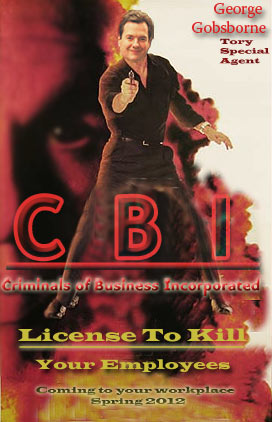 |
 |
|
Osborne Budget Speech Confirms Scrapping Of Health And Safety Legislation George Osborne took the opportunity of his budget speech last week to confirm the government intends to “scrap or improve 84% of health and safety legislation” despite the fact that the governments own adviser Professor Ragnor Löfstedt stated, in his revue of health and safety legislation, that the was no need for a reduction of existing health and safety legislation.
The deregulation of health and safety got top billing in chancellor George Osborne's 21 March announcement of measures for "supply-side reform of the economy." The budget statement said: The statement also referred to action with the insurance industry “in order to tackle the compensation culture”, a phenomenon the government itself has determined does not exist. On page 45 of The 2012 Budget document available from the HM Treasury website, Osborne re-iterates his attack on workers rights with regard to workplace health and safety: Reducing burdens on business “will scrap or improve 84 per cent of health and safety regulation, including legislating in 2012 so that ‘strict liability’ provisions in health and safety law will no longer hold employers to be in breach of their duties when they have done everything that is reasonably practicable and foreseeable to protect their employees;” It goes on further: “will launch sector-based reviews of regulation from April 2012 to ensure regulation is enforced at the lowest possible cost to business, starting with chemicals manufacturing, volunteer events and small businesses in food manufacturing; and has examined around 1,500 regulations through the Red Tape Challenge, over half of which will be scrapped or improved.” This does not auger well for the safety of the environment and of consumers, not to mention the risk to the food chain as regulations are removed which currently offer some form of protection. Further attacks on workers rights are detailed with regard to employment rights and making the UK the ‘most flexible workforce in Europe’: 1.242 To reduce barriers to businesses taking on new staff the Government: has accepted the Low Pay Commission’s recommendation for below inflation increases to the National Minimum Wage; has announced significant deregulation of employment law, including increasing the unfair dismissal qualifying period from one to two years from 6 April 2012 The Government intends to publish the response to the consultation before summer recess 2012; and has provided evidence to the Pay Review Bodies on the economic case for reforming public sector pay to better reflect local labour markets, following the announcement at Autumn Statement 2011. The Review Bodies are due to report from July 2012. In addition, a number of civil service departments that entered the pay freeze in advance of other workforces will exit it from April 2012. These departments will be able to introduce more local, market-facing pay reform from this year, following further work with the Cabinet Office to develop proposals for local pay, as set out in the pay guidance issued by the Treasury. In addition, HM Treasury will conduct an internal review to examine the role of employee ownership in supporting growth and examine options to remove barriers, including tax barriers, to its wider take-up. The review will also consider the findings of the work on employee ownership being led by the Minister for Employment Relations, Consumer and Postal Affairs, due to report in summer 2012, and will conclude ahead of Autumn Statement 2012.” A statement from TUC noted: “While this is a regurgitated mish-mash of previously announced moves, presented as a package in this way it highlights the pro-business, anti-worker agenda of this government. Not one of these proposals will do anything to protect the workforce from the epidemic of occupational disease that we have. Instead it will simply give the message to employers that health and safety is a burden and there is little need for them to give it any priority as there is no chance of them ever being investigated or prosecuted unless they report an injury. It added the Budget focus on safety deregulation “shows very clearly exactly why the TUC is organising a Day of Action on 28 April to defend health and safety.” In a press release issued on the day of the budget announcement, TUC General Secretary Brendan Barber commented on the wider financial implications of the budget: Business lobby group CBI said the deregulatory proposals did not go far enough. 'There needs to be much greater urgency to the government's deregulatory agenda,' said CBI director-general John Cridland. TUC general secretary Brendan Barber described the chancellor's announcement as 'a Budget for the rich by the rich.' See also: Prof Löfstedt Criticises Cameron On Health And Safety Source: TUC Risks / HM Treasury / Personnel Today |
|
|
 Coming just a few days after the IOSH 2012 conference in which Professor Ragnar Löfstedt’s criticised the government for the misuse of his review, and for claiming he said that 50% of health and safety regulation needs consolidating; the government continues its attack on both health and safety legislation and employment rights.
Coming just a few days after the IOSH 2012 conference in which Professor Ragnar Löfstedt’s criticised the government for the misuse of his review, and for claiming he said that 50% of health and safety regulation needs consolidating; the government continues its attack on both health and safety legislation and employment rights. 
 Instead we have got a Budget for the rich by the rich. One minute the Chancellor said he found tax avoidance morally repugnant, the next he rewarded it by cutting income tax for the richest one per cent - with precious little relief for hard-pressed families on ordinary incomes.
Instead we have got a Budget for the rich by the rich. One minute the Chancellor said he found tax avoidance morally repugnant, the next he rewarded it by cutting income tax for the richest one per cent - with precious little relief for hard-pressed families on ordinary incomes.